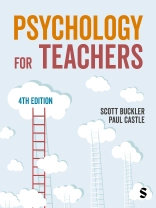This is an essential textbook for teachers and those training to teach on applying research from psychology to education. It offers practical advice on ‘what works’ in the classroom. Not only will you understand how to teach effectively but also why, with explanations deeply rooted in theory and practice. Brimming with references to popular culture and packed with a range of tips, tasks, case studies and critical points, this book will keep you informed and intrigued in equal measure.
This fourth edition includes:
- Significant updates to content on cognitive psychology and educational neuroscience; neurodivergence and special educational needs; and supporting mental wellbeing.
- Condensed and reworked chapters with a stronger focus on practical application in the classroom.
- Classroom examples described in universal terms to support teachers anywhere in the world.
Inhaltsverzeichnis
SECTION ONE: UNDERSTANDING PSYCHOLOGY
1 Introduction
2 Philosophy of education
SECTION TWO: PSYCHOLOGICAL PERSPECTIVES ON EDUCATION
3 Psychodynamic perspectives
4 Behaviourist perspectives
5 Social perspectives
6 Humanistic perspectives
7 Cognitive perspectives
SECTION THREE: THE DEVELOPING CHILD
8 Neurological, perceptual, and physical development
9 The development of the self
10 Social, emotional, personality, and behavioural development
SECTION FOUR: MEETING THE NEEDS OF THE LEARNER
11 Motivation
12 Applied cognitive science and educational neuroscience
13 Neurodivergence within the broader context
14 Mental wellbeing
15 Applied psychological skills
16 Using applied psychology to enhance behaviour
17 The effective teacher
Über den Autor
Paul Castle joined the University of Worcester as a senior lecturer in September 2004. He was a Chartered Sport and Exercise Psychologist, Associate Fellow of the British Psychological Society and registered with the Health & Care Professions Council. As an active practitioner, with over 20 years’ experience, Paul provided applied psychology consultancy to clients in a wide array of disciplines, with a particular emphasis on providing individual- and small-group support to teachers and lecturers, to ameliorate the effects of stress, depression and burnout. As Mental Health and Wellbeing (MHWB or MWB) Lead for the School of Sport & Exercise Science at Worcester, Paul embraced the emerging issue of MWB in students and staff within primary, secondary and tertiary education. He was an advocate for reducing the stigma associated with MWB and provided applied psychological support in guiding students through their own ‘personal challenges’ by a combination of sport, physical activity and psychological skills training. Paul was trained in Mental Health First Aid (MHFA) and Applied Suicide Intervention Skills Training (ASIST), in conjunction with his professional grounding. He was an active member of the ‘Suicide Safer’ Project Group at the University of Worcester, which aimed to promote ‘suicide safer communities’ both regionally and nationally.












